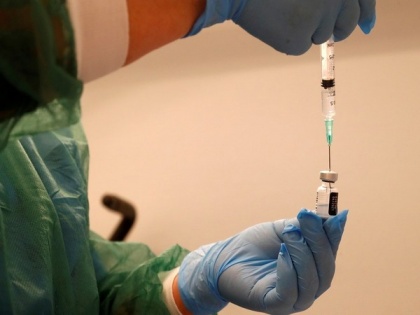US launches study of allergic reactions to COVID-19 vaccines
By ANI | Published: April 8, 2021 03:00 AM2021-04-08T03:00:14+5:302021-04-08T03:10:03+5:30
The US National Institutes of Health (NIH) announced Wednesday that it has kicked off a study to determine the risk of allergic reactions to the Pfizer-BioNTech and Moderna Covid-19 vaccines.

US launches study of allergic reactions to COVID-19 vaccines
The US National Institutes of Health (NIH) announced Wednesday that it has kicked off a study to determine the risk of allergic reactions to the Pfizer-BioNTech and Moderna Covid-19 vaccines.
According to The Hill, the health agency said a phase two clinical trial is underway to determine if people who are highly allergic or have a mast cell disorder are at increased risk for a systemic allergic reaction to any of the two-dose vaccines. In rare instances, there have been reports of people experiencing allergic reactions, including serious episodes known as anaphylaxis, after being vaccinated.
The US Centers for Disease Control and Prevention (CDC) in January said allergic reactions occurred at a rate of 11.1 cases per million doses, with the majority occurring within 15 minutes of vaccination.
"The public understandably has been concerned about reports of rare, severe allergic reactions to the Moderna and Pfizer-BioNTech COVID-19 vaccines," said Anthony S. Fauci, director of the National Institute of Allergy and Infectious Diseases (NIAID), part of the National Institutes of Health.
"The information gathered during this trial will help doctors advise people who are highly allergic or have a mast cell disorder about the risks and benefits of receiving these two vaccines. However, for most people, the benefits of COVID-19 vaccination far outweigh the risks."
The Phase 2 trial, called Systemic Allergic Reactions to SARS-CoV-2 Vaccination, is sponsored and funded by NIAID. The vaccines are being provided by the program led by the U.S. Department of Health and Human Services and the U.S. Department of Defense to develop COVID-19 vaccines and therapeutics. The vaccines are manufactured by Moderna, Inc. of Cambridge, Massachusetts and Pfizer, Inc. of New York.
The NIH said that the study team will enroll 3,400 adults ages 18 to 69 years at up to 35 academic allergy-research centers nationwide.
About 60 per cent of study participants, group 1, must have either a history of severe allergic reactions or a diagnosis of a mast cell disorder, while 40 pre cent of participants, group 2, will not. The specific types of allergic reactions in group 1 participants are related to food, insect stings or allergen immunotherapy and require treatment with a drug called epinephrine; or are immediate allergic reactions to a vaccine or to one or more drugs.
"These reactions will have occurred within the past 5 years. Group 2 will consist of people with no history of any allergic reactions or allergic disease and no history of mast cell disorder. Approximately two-thirds of participants in each group will be female because severe allergic reactions to vaccines in general--and to the Moderna and Pfizer-BioNTech Covid-19 vaccines in particular--have occurred mainly in women," the NIH said.
Participants in each group will be assigned at random to receive either the Pfizer-BioNTech vaccine (one-third of the group); the Moderna vaccine (one-third); a placebo followed by the Pfizer-BioNTech vaccine (one-sixth); or placebo followed by the Moderna vaccine (one-sixth). Initially, neither the participants nor the study team will know who is receiving a vaccine or placebo, or which vaccine is being administered.
All participants ultimately will receive a full two-dose course of either the Pfizer-BioNTech vaccine or the Moderna vaccine.
Investigators will assess the proportion of study participants in each group who have a systemic allergic reaction within 90 minutes after injection with either dose of the Pfizer-BioNTech vaccine or either dose of the Moderna vaccine. Results are expected in late summer 2021.
Study staff will collect blood, urine and nasal swabs from participants before each injection, and blood and urine after each injection. If a significant number of systemic allergic reactions to either or both vaccines occur during the trial, investigators will analyze these biological samples to examine possible mechsms for the reactions and whether certain genetic patterns are associated with higher risk.
"Investigators will closely monitor participants' safety throughout the trial. In addition, an independent data and safety monitoring board (DSMB) will review blinded and unblinded study data at scheduled review meetings to further ensure the safety of study participants," it said further.
( With inputs from ANI )
Disclaimer: This post has been auto-published from an agency feed without any modifications to the text and has not been reviewed by an editor
Open in app